#Not that its in character for *anyone* present to have the emotional intelligence for it - but man LXC is having a very hard time
Text

Embrace the truth
[First] Prev <–-> Next
#poorly drawn mdzs#mdzs#lan jingyi#lan sizhui#lan xichen#lan wangji#wei wuxian#WWX uses NMJ's abs as part of his evidence for identification. LXC is allowed to use his familiar embrace as his evidence.#We are now entering the slow burn arc of 'Lan Xichen continues to lose everything he cared about'.#He has his love of fishing + his good friendship with JGY + his brother. I hope nothing happens to any of those things#Not that its in character for *anyone* present to have the emotional intelligence for it - but man LXC is having a very hard time#Trying to pin his sworn brother as a murderer *right* after identifying the mystery body as his other sworn brother?#of *course* he's defensive! You gave him no time to process!#He's gonna need a lot of time by the pond to cope#The original joke had LXC copping a feel on those glutes and recognizing him that way. Which now looking back *was* funnier#sigh...I need to trust my gut a bit more#Next time on PD-MDZS: They just show up in Jinlin Tai because I want to plot to keep moving
2K notes
·
View notes
Text
why the knuckles prologue was perfect
( + my ramblings and analysis of his character as a whole )
in just six minutes, this short animation was able to show off each and every one of the main characteristics that make knuckles KNUCKLES. six minutes of phenomenal writing did arguably more than (without counting the movie, which did so much to restore honor and respect to our favorite echidna) two whole decades of being pushed to the sidelines, made into a punchline and pulled away from where he should be in the first place! and we start with the obvious:
1) HIS ROLE. KNUCKLES IS BACK ON DUTY, PERFORMING HIS FATED ROLE! he's guarding the master emerald and not only do we get to see him standing at the altar again, but we also get to see him introspecting about his responsibilities in a manner very reminiscent of his story mode cutscenes in sonic adventure (1998), yet building off from their foundation:
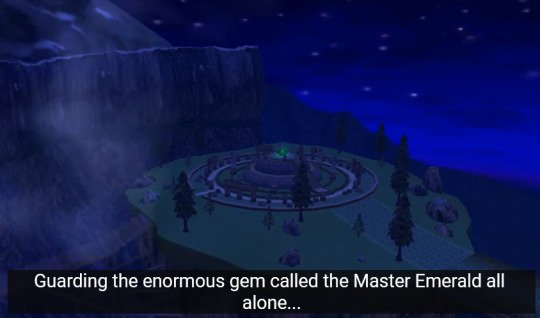
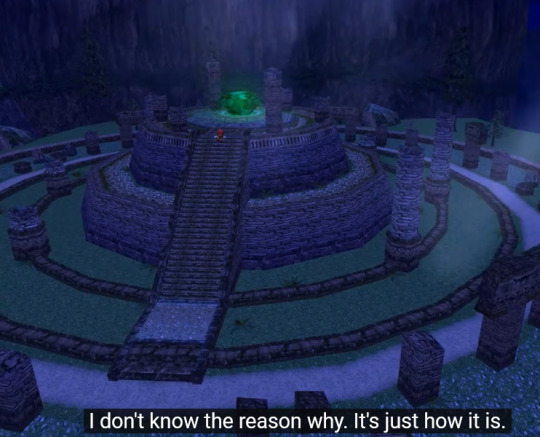
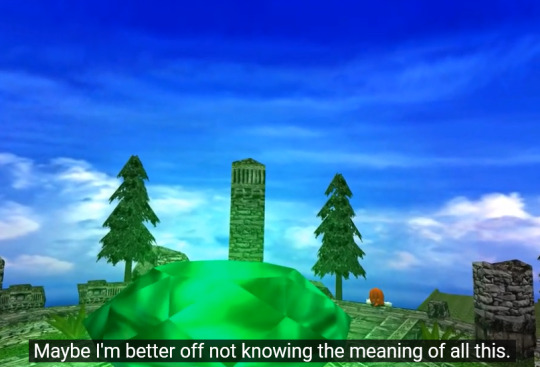
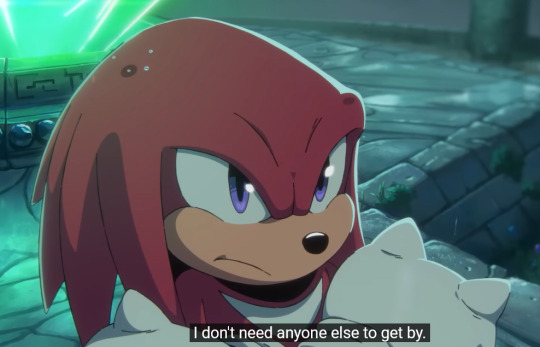

knuckles is tied to a responsibility without a clear reason, a fated one. he doesn't know the answers or the reasons behind why things are the way they are, only seeing things as objectively as possible because it's all he can truly be certain of; he's had to grow up accepting that no matter what, he will continue to stand guard by the emerald, because it's what he was chosen to do. he's alone in the present, as he always has been, and he's grown used to that independence. he prefers it over anyone's help or company, in fact. that doesn't mean that he doesn't question it, even while seemingly powerless in the face of his destiny. i think having knuckles reflect upon his duty is an excellent service to his character and a necessary one to really have the chosen one trope and its full potential shine.
recent years have shown us countless fanon (and canon, thanks to SEGA!) misconstructions of knuckles as dumb, stupid and laughably clueless when that couldn't be further from the truth. he's ignorant, yes! naive and gullible and ignorant but only because of his years of isolation, clueless only because he lacks the knowledge as someone who's been, for the greater part of his existence, firmly dedicated to fulfilling his sacred task as a guardian to angel island. and there is a WORLD of difference here. his ignorance shouldn't conflict with his intelligence. his introspection shows just how much of a deep thinker he is, how curious he is by nature, being born into a land and a civilization enshrouded in mystery. with so much time to oneself, who WOULDN'T question the status quo?
2) KNUCKLES EXPLORING HIS OWN ISLAND! expert treasure hunter knuckles who, thanks to his curiosity and the endless hours of solitude confined to his island, is always seeking to learn more about his home. he's shown to be highly in touch with his surroundings, going above and beyond to perform as its guardian and gaining some knowledge along the way. he may not have all of the answers, but each day he knows more than the last. he's so familiar with angel island, while having so much in it left to uncover.
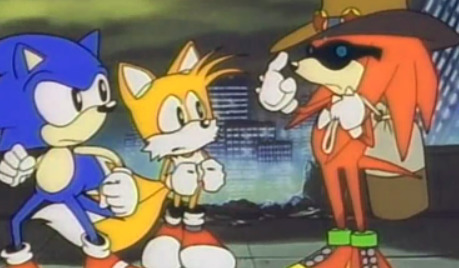

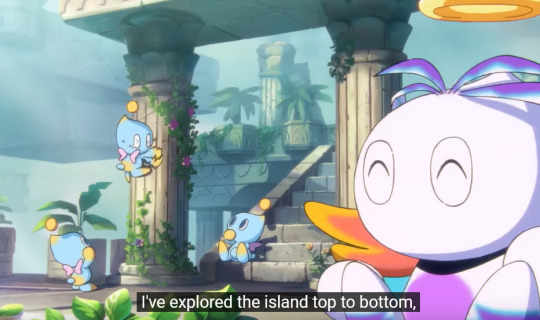

3) HIS EMPATHY. knuckles has ALWAYS been meant to be empathetic, driven by a heart of gold to help others fulfill their own goals in a very selfless manner and seeing the best in everyone, EVEN when they choose to act upon their worst. this is part of why he's tricked over and over by eggman! he can't deny someone in need a helping hand, and eggman, knowing this, takes advantage of him. he's one of the most selfless characters in the entire franchise, and his selflessness is once again put on the spotlight:



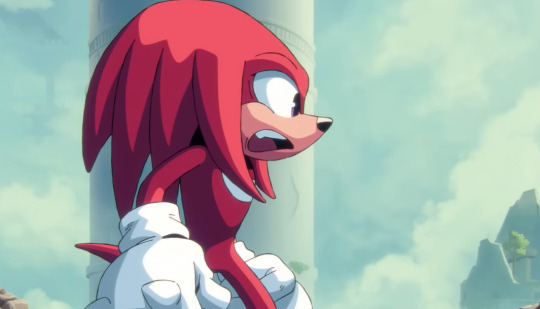
when he sees someone in distress, the empathy is written all over his expression! he's highly sensible to people's emotions and emotionally aware of them, perhaps more than he is of himself. he cares so much and so deeply about others! in spite of having nobody to care for him while he watches over angel island, he doesn't think twice about being there for everyone else.

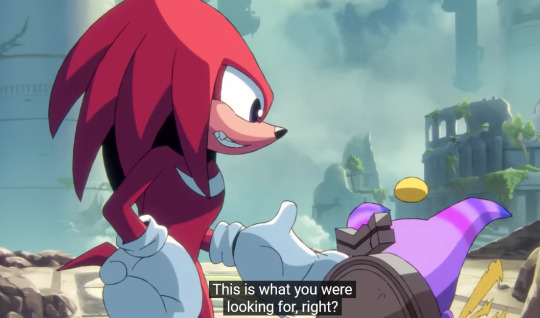
his tenderness is more important than i can put into words. he's a sweetheart, through and through. power comes from the heart.
and speaking of power...
4) HIS PHYSICAL STRENGTH. not only do we get a glimpse of his mind and his heart, but the power of his fists. the rough, brash, badass knuckles we all know and love is BACK full force, and this short makes sure to highlight once more, right along with his mental fortitude and the force of his kindness, just how STRONG he is on a physical level:


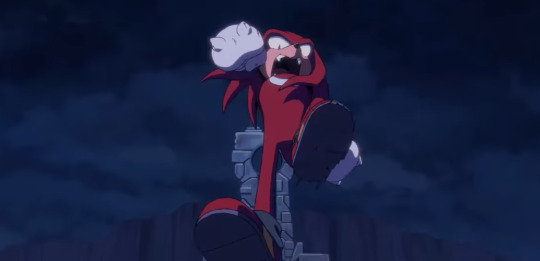

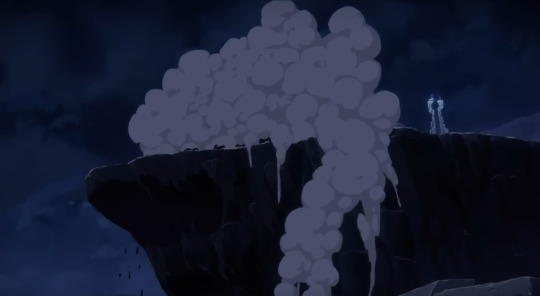
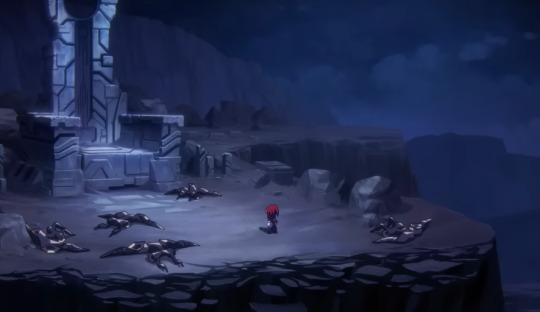
these images speak for themselves. knuckles means BUSINESS. and his fists are NOT to be meddled with! he is NOT here to be underestimated! he breaks off a significantly large portion of a CLIFF with just one punch. this fight scene was AMAZINGLY choreographed, 100% serious knuckles, rougher than the rest of them and hard as nails as he always has been. this side of him shouldn't conflict with his introspective side, his inquisitive spirit or his golden heart—they are ALL essential parts of him that can and should exist in TANDEM. exaggerating one or another would be unfair to representing his truest form. a big part of knuckles' character is about keeping things balanced, outside of himself as well as within, and though his temper can flare when provoked, though he can be impulsive and ruthless, he is just as calm and collected and merciful.
and if you ask me? this short achieved just that. it struck a PERFECT balance between these traits and in doing so gave us such a careful and true picture of knuckles being knuckles.
i hope that frontiers will be the start of a new era of sonic fans, old and new alike, appreciating knuckles' character like he deserves to be appreciated, starring in all of his glory and developing beyond the broken image of him that many people were left with for far too long.
to everyone who worked on this animated short, you have my highest kudos and respect—with just one week before the release of this game and such stellar writing on display ALREADY?, i have such high hopes that this story will deliver something great.
#sonic frontiers#knuckles prologue#frontiers prologue#sonic#sth#sonic the hedgehog#knuckles#knuckles the echidna#amy rose#tails the fox#sonic and knuckles#sonic & knuckles#miles tails prower#sth analysis#sonic textpost#sth textpost#knuckles the enchilada#sega#frontiers spoilers#frontiers#sonic frontiers: divergence#sonic frontiers divergence#this is ultimately mostly opinion#and character analysis yeah but#i just love knuckles a lot that's my son that's my boy and i want nothing more than to see him done justice#AS HE DESERVES#GOD PLEASE I'VE WANTED THIS FOR SO LONG#THIS SHORT ALONE WILL FEED ME FOR MANY WINTERS TO COME#baby's first ramble post on tumblr dot com#opinion post
543 notes
·
View notes
Text
character sheet in the undercut 😊
(Might do one for Rowan later)
Marvolo🐍🖤
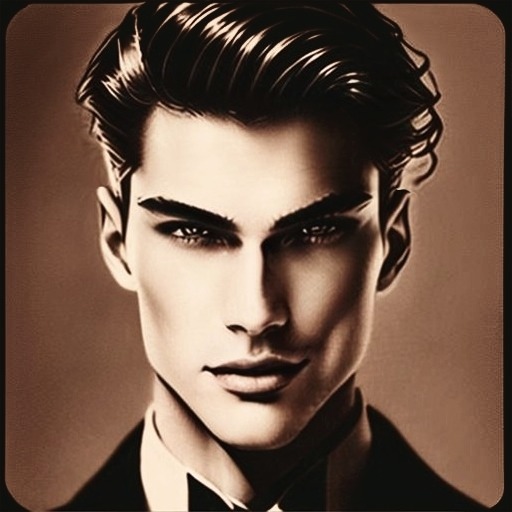
Character Chart
Character’s full name:
Marvolo Aleister Gaunt.
Reason or meaning of name:
The name Marvolo actually means "inflict injury" and Aleister is his father's name.
Character’s nickname:
Aside from "pet names" Its mainly Volo, to people who are close enough to shorten his name.
Birth date: 8th of December 1864
Physical appearance
Age:
26
How old does he appear:
Could probably pass for like 30.
Weight:
Around 210lbs
Height:
6'5
Body build:
Toned/ Muscular.
Shape of face:
Diamond face shape.
Eye color:
Golden Hazel.
Glasses or contacts:
N/A
Skin tone:
Pale
Distinguishing marks:
N/A
Predominant features:
Large front teeth.
Hair color:
Black
Type of hair:
Somewhere between wavy and straight. Can be kinda flicky.
Voice:
Deep/Hoarse
Overall attractiveness:
Very (my personal opinion obviously🤣)
Physical disabilities:
N/A
Usual fashion of dress:
Smart
Favorite outfit:
Black suits.
Personality
Good personality traits:
Loves hard (those he cares about).
Intelligent.
Funny (when he wants to be)
Bad personality traits:
Litteral Murderer 😅
Can be very Arrogant and cocky
Generally nasty and sarcastic.
Mood character is most often in:
Focused.
Sense of humor:
Dark (but can be goofy)
Character’s greatest joy in life:
Having power and strength is a huge thing to him.
Character’s greatest fear:
Losing someone he cares about.
What single event would most throw this character’s life into complete turmoil?
*See above*
Character is most at ease when:
With his partner/ Reading.
Most not at ease when:
On enemy ground.
Enraged when:
Betrayed.
Depressed or sad when:
Thinking too deep about certain things.
Character’s soft spot:
Romance with Partner and Bunnies
Is this soft spot obvious to others?:
To his partner yeah, and the bunny loving he keeps on the down low to most people.
Greatest strengths:
Confidence, Cunning, Power.
Greatest vulnerability or weakness:
Short fused, doesn't handle overwhelming feelings very well.
Biggest regret:
Using crucio on Ominis when they were kids
Character’s darkest secret:
There's a reason secrets are secrets👀
Does anyone else know?
Only Rerek.
Past
Type of childhood:
He holds both good memories, but with certain trauma thrown in there.
Pets:
Rerek (companion)
First memory:
Playing in the garden with rabbits.
Most important childhood memory:
Ominis coming home.
Education: Hogwarts.
Religion:
N/A
Present
Current home location:
Gaunt Manor.
Currently living with:
Family
Pets:
Rereks still going🐍
Occupation:
Den boss / "butcher"
Family
Mother:
Ophelia Belladonna Gaunt.
Relationship with her:
Good relationship.
Father:
Aleister Morfin Gaunt.
Relationship with him:
Rocky to say the least.
Siblings:
Ominis Matthias Gaunt.
Relationship with them:
Very typical brother relationship, sometimes they hate each other, but they care for one another.
Spouse/Partner:
Aurora Winters.
Relationship with her:
Grounded, caring, loving relationship.
Habits
Hobbies: Reading, Murder...You know? the usual 🤣
Plays a musical instrument?:
Piano.
How he/she would spend a rainy day:
In bed with Aurora 😏
Spending habits:
Doesn't worry about money, spends it frivolously.
Smokes:
Yes
Drinks:
Yes (but isn't an alcoholic or anything, he just likes a drink every now and again)
Other drugs:
Depends on what kinda mood he's in
What does he do too much of?
Thinking.
What does he do too little of?
Self care mainly.
Extremely skilled at:
Dark magic and other unsavoury things.
Traits
Optimist or pessimist?
Dark Optimist.
Introvert or extrovert?
Extrovert with introverted tendencies.
Daredevil or cautious?
A calculated Daredevil.
Logical or emotional?
Depends on the situation and who's invovled.
Disorderly and messy or methodical and neat?
Methodical and neat mainly.
Prefers working or relaxing?
Both.
Confident or unsure of himself
VERY confident.
Relationships with others
Opinion of other people in general:
Doesn't TEND to like people.
Does the character hide his true opinions and emotions from others?:
If he doesn't like you you'll know about it, and if he DOES like you, you'll see that. So no.
Best friend(s):
Rerek and Rowan.
Love interest(s):
Aurora Winters.
Person character goes to for advice:
Aurora, and Ominis if he NEEDS advice, he's usually pretty sure of himself.
Person character feels responsible for or takes care of:
Aurora and Ominis.
Person character feels shy or awkward around:
N/A
Most important person in character’s life before story starts:
Himself.
After story starts:
Aurora.
~
63 notes
·
View notes
Text
Link Click Season 2 Episode 10 pt1
Okay. Taking a deep breath before documenting my thoughts because that was some info we got.
like first off --
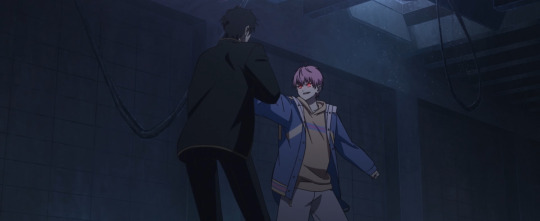
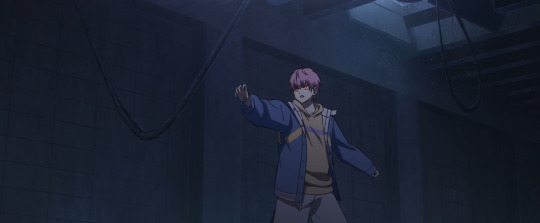
How did he do that???
When I tell you I paused the episode and put my head in my hands for five minutes.
I have some dead end theories, but for now that one is a mystery for future me to chew on.
What I want to discuss:
Now that we have confirmation, I want to start talking about the implications of mixing and matching our character's abilities. This gets dark. If you want to live in a brighter world with happier theories, look away. I don't blame you.
Lu Guang can see into the future of a photograph through the eyes of its photographer.
Cheng Xiaoshi can possess the photographer and even feel their emotions.
Li Tianxi can see through a photograph what a person in the present is doing and feeling.
Li Tianchen possesses people in the present through touch.
There's a reason these abilities are paired as they are. If Li Tianchen worked with Lu Guang? Well, he could see the photograph. That's no benefit.
If Li Tianxi worked with Lu Guang? Similar issue. She goes to the present and gains memory. No need to see the past.
If Cheng Xiaoshi works with Li Tianxi? Well, yeah, they just did that. It's useful for undercover intelligence gathering, but not much else.
If Cheng Xiaoshi works with Li Tianchen? This is where things can get scary.
A dark thought has been nagging at me. And now that we have confirmation on what each individual twin's powers are are, I'm ready to discuss.
I’m interested, logistically, in what would occur if Cheng Xiaoshi and Li Tianchen combined powers.
They both have a possession ability.
They both take over a body.
Each time we see Li Tianchen take possession of a body that Cheng Xiaoshi is occupying, Cheng Xiaoshi is forcibly evicted.
Yes, I understand that these possessions have been coming from opposing sources and not one source traveling through another. That's the point.
I don't think this will work out as simply as anyone wants it to.
Li Tianxi doesn't have a possession ability. She's just an observer and an empath.
Cheng Xiaoshi does have a possession ability. And he, too, feels their emotions.
If Li Tianchen dives into a photo through Cheng Xiaoshi, how aware would Cheng Xiaoshi still be? Even Li Tianxi maintains some awareness if her ability is used (and that was a horrifying thought I'd suppressed for weeks, thanks Link Click, I hate being right.)
Look, both Li Tianchen and Qian Jin seem to think that Cheng Xiaoshi can change the past. But from Cheng Xiaoshi's current perspective? He can't. He's tried. In his experience what has happened -- will happen. That logic has been his sword. And to "leave the past be" is drilled into his mind.
I think -- and honestly I pray that someone talks me down from this because I hate this thought--
I think that Li Tianchen wants to protect his sister. I think that Li Tianchen doesn't want to change the past. He doesn't want to bring anyone back to life.
I think Li Tianchen just wants to make it so those acts weren't committed by Li Tianxi.
And if -- and admittedly this is stretching it -- but if somehow Li Tianchen had the foresight to send a selfie to a certain phone before each person died...?
He's found a way.
#This gets super dark I'm sorry#but LTXs story is already a nightmare#Another post will be needed to supply evidence I have more thoughts on the matter but this is long#I'm slowly going insane and this theory is wild even for me#I realize I contradict myself in tiny ways each time post#new episodes mean evolving thoughts#but I'm stuck in all the holes please dig me out#link click#时光代理人#shiguang dailiren#link click spoilers#my lc theories
49 notes
·
View notes
Text
Bilingual Cinema: Language and Great Representation in Media
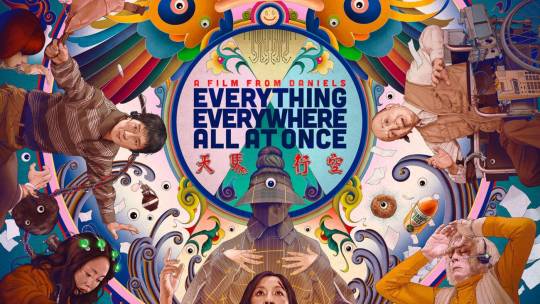
Everything Everywhere, All at Once, 2022
One of my favorite little things about living in such a diverse American city on the West Coast is the multitude of languages flowing in and out of my ears as I commute, people watch, or even sit idly in class. Elderly Asian ladies filling a bus with the sound of Vietnamese chatter or blaring music with lyrics woven in Spanish erupting from a truck zooming down the road. While I am only properly fluent in English, I’ve found beauty in the bilingual streets of my home town and am overjoyed to see this same beauty translated onto the big screen as the movies we produce more closely reflect the diverse cultures present throughout America.
There appears to be a growing trend of bilingual movies which heavily feature multiple languages that are baked into the infrastructure of the dialogue. No singular language takes precedence over any other as languages, dialects, and accents all flow together naturally. Americans who previously incessantly whined about subtitles are now sitting in theaters reading subtitles in The Farewell and Everything Everywhere, All at Once which took home Best Picture at the Oscars earlier this year. These bilingual films continue to push the bar of representation as people of color begin to tell their own stories using their own languages.
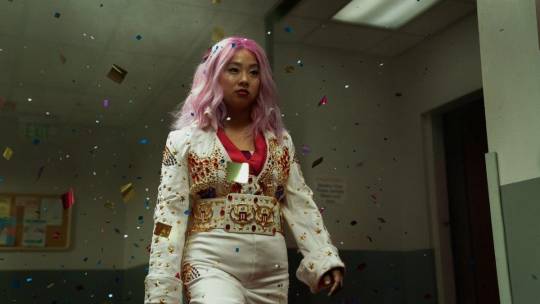
Stephanie Hsu in Everything Everywhere All at Once, 2022
The Daniels’ 2022 Chinese-American absurdist amalgamation of wildly varying genres, Everything Everywhere All at Once proudly features English, Mandarin, and Cantonese. The film proudly introduces us to a realistic portrayal of an Asian-American family and coaxes us into their family dynamics and larger than life sci-fi story as the movie branches off into much more imaginative territory.
To those of you who haven’t had the pleasure of watching it, (seriously if you haven’t, go see it) the film follows Evelyn, the mother of a Chinese-American family and the struggling laundromat business she runs with husband Waymond while she attempts to reconnect with her daughter Joy. As an exclusively English speaker so much of the nuance of the film’s use of language goes completely over my head but Youtuber Language & Film has uploaded a concise little video on the film’s clever use of language which I wholeheartedly recommend checking out. If anyone wants a more in depth analysis of language’s role in the film, I’ll put a link down below.
What I particularly love about Everything Everywhere All at Once is how unashamed it is of Evelyn’s immigrant narrative. While Evelyn appears at times to be somewhat insecure about her broken English, the film never once equates intelligence with fluency; a vicious mistake Hollywood frequently makes with stereotypical Asian characters. The reason why myself and so many others connected so deeply with the film is just how honest and grounded the portrayal of this family is. Not once does it flatten the characters to the archetypes we commonly see of Asian characters in media, they aren’t the model minority or even a completely cohesive family unit as divorce looms in the back of Waymond’s mind. Despite the business of life and the film itself you can feel the cluttered love of this family throughout its runtime and I was so glad to have been able to hear the mixture of different languages that just adds to the chaos of the household.

Past Lives, 2023
I left with a well of emotions brewing deep in my gut after finishing a viewing of Celine Song’s Korean-American romantic drama, Past Lives, earlier this week. Beautifully shot and written, the romance between two childhood friends is told throughout decades as Nora Moon and Hae Sung weave in and out of each other’s lives. A mix of Korean and English is used throughout the film as Nora becomes more fluent in English after she emigrates and Hae Sung speaks almost exclusively in Korean. Director Celine Song told Polygon “...she [Nora] sounds like a kid when she speaks Korean — because she emigrated when she was a kid, and she only really speaks to her parents in Korean. So it kind of made sense that she spoke Korean in a childlike way.” Little details like this really flesh out the characters and make them seem real, the same language logic is applied to the whole cast as they each have varying levels of fluency in both Korean and English.
Similar to Everything Everywhere All at Once, the film’s bilingualism is informed by its distinct Asian diaspora and is told through the eyes of Nora Moon who moved to Canada at the age of 12 leaving Hae Sung along with her old name Na Young behind in South Korea. When Hae Sung visits Nora in New York much later in the film, after all those decades Nora notes that Hae Sung has all these “Korean views” on everything and that she somehow feels less Korean and at the same time more Korean while being with him all at the same time.
I felt very deeply connected to Nora in this moment, neither of my parents had ever imbued in me the cultural values of my heritage. I am Vietnamese on my mother’s side and Mexican on my father’s. I find myself feeling self consciously Viet around my Vietnamese friends and self consciously Mexican around my Mexican friends but throughout it all a strange Americanized shame persists within me since my parents have been thoroughly white washed. And although it was a small moment in a nearly 2 hour film, I still can’t stop thinking about that confusing, conflicting feeling Nora described regardless.

Los Espookys, 2019
The wonderfully idiosyncratic, beautifully queer Latino comedy show, Los Espookys has spoken dialogue in both Spanish and English and often goes back and forth between A plots in Spanish and B plots in English. Created by Ana Fabrega, Julio Torres, and Fred Armisen, the show itself is about a couple of friends who decide to follow their passions and start a “horror group” performing various oddball tasks with spooky theming. In one episode they manufacture a sea monster sighting to revive tourism in a coastal beach town, in another they create a monster mascot named Bibi’s to teach an elementary class a school lesson. It is simultaneously hysterical and charmingly strange almost constantly.
Los Espookys main cast of characters consists of proud queer goth Latinos, they’re aware their infatuation with horror is a little weird but they never shy away from that and honestly love that about themselves. The only part of their identities that the main characters have trouble with is getting others around them to accept that strangeness into their lives. The show’s original ambitions were to air on a Spanish-language cable channel but when presented to HBO Latino, the team was offered a chance to bring it to HBO’s main channel to a much wider audience and, like the show’s characters, the creators had to find a way for American audiences to let that strangeness into their living rooms. Dave Itzkoff writes in the NY Times that, “...he [Armisen] wanted to create a Spanish show “that isn’t an explanation of Latino culture, that’s moving past the foreignness of it.””
Watching the show itself really impacted me, not only did my lungs hurt from laughing but being able to laugh along with queer Latino goths who had similar queer experiences as me was a real empowering treat. What struck me most, besides the gags, was just how natural this representation was, there are seamless transitions from the English spoken parts in America or the embassy and the parts in the fictitious Latin American country the show is set in. No member of the cast is reduced to a simple trait based on sexual orientation, race, or any other archetype, there is so much personality and life present in each character. Renaldo for example, is aro ace, loves all things horror, hates when people misspell his name, and is incredibly passionate and caring about his friends. Nobody’s sexual orientation nor accents are the focus of any one joke or define them as individuals, it is an overwhelming uplifting show and the bilingual nature of it is just another proud part of the show’s hand crafted identity.

Sr. Bibi's from Los Espookys, 2019
What I really want to hone in on and celebrate about the appearance of bilingual media is how filled with pride these works are, how lovely it is that the media we consume is starting to better reflect the colors, languages, and cultures that populate the world around us. I really can’t recommend Everything Everywhere All at Once enough but I’m sure almost everyone online has already praised it to the moon. Be sure to catch Past Lives while it’s still in theaters because it is a real treat and one of the best movies so far this year. Los Espookys is a total sleeper hit that I fell in love with from episode 1, if I get at least one more person to watch that show I can die happy. I was tempted to lengthen this post with 2019’s Sound of Metal (which I am a little more critical of) which features American Sign Language but I think I’ll save it for a later post since this one is long enough. If anyone wants to recommend any bilingual pieces of fiction whether it be movies, tv, or even games please, by all means, let me know! I’d love to hear all of your recommendations and opinions, keep it real guys.
-Ghost Emoji 👻
Links and Stuff :P
Language & Film Youtube
Past Lives Polygon Article
NY Times Los Espookys Article
#organmart#om-ghostemoji#writing#personal essay#language#movies#film#movie recommendation#tv recommendations#eeaao#past lives#los espookys
40 notes
·
View notes
Text
Mike Wheeler; One Dimensional?
I've been confused about Mike for a long, long time. And, after watching the season with my Mom, I realised most people are. He's an interesting character. Shy yet witty, humble yet dramatic, caring yet stubborn. These traits contradict each other, but Mike Wheeler presents them all.
So, what is the Duffer's intention with this character? A boyfriend for El? A protagonist? Comic relief? The show tells us that he's more than this with his variety of scenes and moods, emotions and actions.
Compare him to, for example, Lucas or Dustin. Lucas, the strong-willed, thoughtful, courageous companion. Dustin, the intelligent, level-headed, empathetic guide. These characters are consistent throughout the show.
They present both positive and negative qualities that impact their lives, that cause complications and lead to timely resolutions. We are shown from start to finish the troubles that they go through, their thoughts, emotions, all demonstrated for the audience to easily see.
But it's not like that with Mike. And that's why he's so complicated.
In season 1, we see him faltering at moments where he misses Will, but we also see him striving when he gets the chance to help El. In season 2, he's miserable, calling for El, unable to save her, until Will gets possessed. Then, he has someone else to rescue. He devotes three days to saving Will and stopping the Upside Down. In season 3, El has harnessed her powers. He dislikes her strength because it means she doesn't need his saving. We also notice that whenever Will senses the Upside Down, Mike is immediately there to check on him.
I dive into a little more detail on season 1 here.
So, why is he wrote like this? Why is he written to be confusing and contradictory to himself?
When I was talking to my Mom about the characters, she told be she 'didn't like Mike and Will'.
And upon asking her why, she said, "It seems like the actors have many layers, their acting is very multi-dimensional"
She spoke about Will's boring character arc in season 3 and we laughed about that a little bit.
A bit later, I asked her why she didn't like Mike, and she explained that his character is:
"His character is very one-dimensional in season 3. He's kind of just swooning over El"
It's not just me, someone who has delved into analyses and theories about Mike and Will, but a casual viewer.
But, what shocked me the most is that she was right. She had a point. An extremely good point. The acting is multi-dimensional. Proving that there is more to Mike than what we see.
With the recent Premiere interviews, we can conclude, I think, that Mike's ultimate goal is to save the people he loves, and when they don't need saving, he's unsure of himself. It's like a reflex, his mind tells him how to protect and care in scary situations, but not how to 'be normal' in 'normal' situations. I think it's safe to say he's become comfortable with his friends, but when, for example, Max is introduced, he's awkward, resentful, shy, until Will has an episode and he gains confidence again.
In season 3, its been a long time since he's had anyone to 'save'. El has been living safely with Hopper, Will has returned to almost-normal. He loses himself, I think, when he can't ground himself in saving the people he loves. I believe a contributing factor is also his desperation to impress people (mainly El, the first girl whose shown any signs of wanting to be with him). He proceeds to adapt Lucas's 'maturity' and enhance his own dramatics, straying from who he was in the past seasons because he thinks that's what made him 'unlikeable'.
And I think El's unbreakable admiration for him didn't help, either. He could act however he desired, and she would still want to be with him. She mistook appreciation and gratitude for something in the lines of love (likely from watching all the soap operas). Not El's fault, not Mike's fault, but simply a lack of proper understanding and communication.
When Will was alone on the swings, Mike went up to him, despite not knowing him at all. He chose to save someone he didn't even know. Mike is not one-dimensional jerk he seems to be, he's just unsure. Unsure of himself, unsure of the people around him, unsure of his relationships. You could even say he's....
"trying to figure himself out...whether that's with El or not..."
"learns a lot about himself...how he sees his relationships with other people...a lot of understand-ment and growth"
#byler#mike wheeler#stranger things 4#stranger things#stranger things analysis#byler analysis#byler proof#mike wheeler is gay#st theory#st analysis#willxmike#byeler#mike wheeler analysis#mike wheeler is in love
345 notes
·
View notes
Note
In Canon (JTTW) Wukong shows any romantic/sexual interest towards anyone?
Not Even Slightly fasfgrewdf. Going by Wu Cheng'en's version it's Zhu Bajie who's the romantic/libertine of the pilgrim group, while if memory serves correctly the main emotion Sun Wukong shows towards romance and sex is irritation. The Monkey King does have real affection for his monkey family and later on for Tang Sanzang, but it's the affection of an asexual communal grandpa lol.
That said, this characterization in Xiyouji is a big change from the monkey's presentation in the earlier play Zaju Xiyou Ji. Here, the simian in question, Sun Xingzhe, not only had a wife that he kidnapped in traditional Chinese monkey monster fashion, but apparently spends most of his time telling crude jokes, ogling other women, and acting as a rowdy clown.
I've now seen a number of pretty valid points about how it definitely pays to look outside of Wu Cheng'en's version of the westward journey to see what other people have made of it throughout its history, and I'd definitely agree that seeing what else could be considered part of JTTW "canon" in terms of the wild variety of ways people have told and retold this story is a really fascinating thing!
That said, I do think that coming at it from a western perspective one miiiiiight want to be a little more cautious of how one approaches the question of a Sun Wukong romance/sexual interest, given the long history in this part of the world of not only viewing and presenting monkeys as hyper-sexual beings/ man's poor imitation, but also using that perception to bolster a lot of horrible stereotypes against certain groups of humans, including against Chinese people. As is--and while in China itself Sun Wukong has been presented as everything from a devoted and helpful deity to a lecherous and destructive warlord--at this point there definitely does seem to be something of a preference in western depictions to emphasize the destructive and "stupid monkey" potentials of Sun Wukong's character rather than for example his love of family or his intelligence.
#anon answered#journey to the west#jttw#jttw retellings#sun wukong#monkey king#I know the anon was asking about something else#but man I am once again asking wtf is up with western creators making swk illiterate#but anyway#in regards to this swk actually seems to be something of an outlier in terms of having 0 interest in sex or romance#given what I know about stories concerning other monkey yao in Chinese folklore#& even in other versions of the monkey king#but that's a post for another day#or you could see what journeytothewestresearch has said on the subject#if memory serves correctly he's done a good summary on potential inspirations for the monkey king#including some of the more lecherous monkey monsters in Chinese folklore
14 notes
·
View notes
Text
Can one seriously be a true Tolkien fan AND a lover of the Halbrand/Galadriel dynamics in TROP?
I have been a hardcore fan of Tolkien's work for 20 years and especially enjoyed the feast of mythology that is the Silmarillion. So I'm fully aware that TROP took (too) many liberties from the lore and disregarded its time/space framework, almost as if it were a different story than that Tolkien wrote. And I don't want to delve into the polemics of what could have been done differently with the Appendixes material they owned the rights to.
What really interests me here is that much of the dynamics between Galadriel and Halbrand/Sauron, though not being in the canon/lore, stems from issues that were present there, except they lacked any romantic undertones. Galadriel has actually been fighting Sauron in her mind for centuries, and this must have started somewhere.
TROP gave its own interpretation of one of these possible starts, and as far as these two characters are concerned, it doesn't bother me. One can love the lore and at the same time enjoy an interesting, new take to two powerful characters, that creates something new with them. Is it a fanfic-like move? Yes. Is it disrespectful towards Tolkien? Arguable.
The question would then be, to what extent is fan-fiction disrespectful? Are some works to be shielded by it, up in their ivory tower to prevent "tainting"? I mean, has anyone ever created a fanfiction on the Divine Comedy? (I t'd be soooo fun if they had!). Where are we to draw the line between literature and creativity?
In the end, a work of art such as LOTR will not be tainted by any faulty rendition. If one truly loves it for what it is, and especially strip it of any religious/ideologocal layer that was quite far from Tolkien's intentions, a series such as TROP changes nothing. One will always have to go back to the book, and the book alone (possibly in the indescribably beautiful English of the original), to find the real LOTR, as all adaptations (and even translations) involve some degree of distancing from the source material.
Back to the two of them, then.
I personally think the screenplayers knew very well what they were doing in colouring the interactions between Halbrand and Galadriel with not-so-subtle romantic shades. The fact that the actors label it as an interpretation from the audience, I can understand, but if so many people caught these undertones, it's no longer an interpretation, it's simply the audience's ability to catch on the non-verbal cues, one that we almost all possess. The light, the music, the proximal distance, the cut of scenes, and, even the way the actors delivered some lines at the physical level are all cues. They cannot possibly have been ALL dropped there by chance.
So, the romantic possibility of the connection is there to be, if not seen, at least perceived in a tangible way, although never confirmed. This was, cynically speaking, a bold but intelligent move. Proof is the 130 and counting fanfics that sprouted in less than two weeks from the last episode's airing (some of them remarkably well-written).
The heroine/villain and (unacknowledged)lovers-to-enemies tropes are too powerful not to be used by a show which hundreds of millions of dollars have been poured in. In doing so, they opened up new and interesting territories to explore, that make it more entertaining for a consistent faction of fandom.
I, for one, thoroughly enjoyed the opening of a space in which two such characters might be bound to experience something akin to love that has no time enough to bloom, but that will potentially loom in the back of their minds for millennia, charging their conflict with a rich array of complex emotions, a connection beyond time and space.
Even knowing full well how doomed such a romance is, its ability to inspire amazing levels of creativity is undeniable, and as such, it can be welcomed without subtracting anything to a more traditional enjoyment of the Tolkienian lore in all its fantastic richness.
The LOTR's author loved stories, after all.
#haladriel#halbrand x galadriel#galadriel x sauron#the rings of power#the lord of the rings#archetypes#literature#trop#lotr rp#saurondriel
58 notes
·
View notes
Text
thoughts. abt death note and intelligence
d=eathnote doesnt portray intelligence the capitalistic way i initially thought it did.
Light's backstory is that he is the top student in all of Japan/L is the smartest detective in the world. We start off with an impression that inelligence is the most important value to show. (But there's nuance!!)
We have the ranking system at Wammy's, which is used to test genii little kids (I don't have a ton of confidence in this type of thing from my experience with testing and my understanding of bias in IQ Testing) ...we don't know how exactly the test works, but is used to test kids for skill equivalent to L's.
Having a ranking system for kid's intelligence is such an awful idea to begin with. Especially if they are aware of the rank. Its inhumane and leads them to beleive their worth is based on their intelligence output. (NOT UNLIKE THE MFKING AMERRICAN EDUCATIONAL SYSTEM) but anyways...
So already the show is centering reasoning ability/intelligence as a value for these kids. (And I think it's fair to say that as a result, other values are deprioritized, like social/emotional intelligence (for example L talks about being childish and wanting to win))
And we see that intelligence increased a characters audience perceived standing on a surface level basis, since on first look, intelligence is what moves the plot.....!
But! While reasoning ability DOES impact a characters importance/value to the show, social intelligence/ a lack of reasoning ability DOES NOT.
Which is fucking WEIRD, but if we go back to L for a second, he has. no social intelligence. Like. My man doesn't wear shoes. He wiggles his toes around and in general is a weird ass dude. But he's essential to the show, and his lack of social skills/presentation is overlooked by fellow characters and the audience, in favor of his smart lil brain.
There's also Misa, who has high social intelligence but low reasoning skills (i personally think she has average intelligence, im just comparing her relatively, and on their weird-and-makes-no-sense intelligence scale). She is loved as an idol, but treated as a dumbass by the detectives. For her, whatt i have seen is that her high social intelligence is overlooked by her lack of intellectual (?) intelligence... And yet Misa makes huuuuge contributions to the plot, and in general is a very important character.
the only time i felt there was real depth of conversation was towards the end when L was about to die and it was raining, where light and L talk more metaphoircally and abstractly with each other, and we see social intelligence. this was a key moment where we saw characterr to character interaction not based around reasoning, but as a casual setting.
since these ttypes of conceptual, abstract scenes are the minority in this show, its clear that the back and forth of l/lights tthought process is really the central value. idk. i think its kinda stupid and they coul dhave added much more depth to the characters.
I think that the decision to highlight intelligence is definetley what makes it deathnote. so yk. it is what it is. but also, they could have handled the treeatment of "less smart" characters with more care. they could have gone deeper into the emotional effect of these decisions.
not to mention the social interactions between characters... the ahllucinations that L experienced beofre deatth were just. so well done. and because of the staunchness of the est of thte show. those moments were sort of coveted and craved. idk. maybe thats a goood thing? who knows.
im also not going to discount the small funny moments in the show. like where L is beig especially awkward or creepy, i think those scenes give LIFE.
But I wish they had more respect for misa and didnt fuckiung rruin her towards the end.
I don know if this makes any fuckin sense. If anyone has additional thoughts realted to this let me know!!
#really not sure if i wanna tag this but fuck it#death note#light yagami#l death note#l lawlight#misa amane
140 notes
·
View notes
Text
oba yozo and warped perception
ok heres an absolutely giant analysis (its 2k words ermm) that i wrote in an essay format! i cant rlly say im proud of its strength as an essay but i do like the concepts i brought up here so i might eventually redo but it took me literally a week so i cant not post it
yozo is my little guy i want to put him under a microscope and study him like a bug/aff
its under the cut :]
TW: su1cide, s3xual a$sault, misogyny (all mentioned, not depicted)
Osamu Dazai’s No Longer Human, a Japanese literary classic, is told through the writings of the protagonist, Oba Yozo. Yozo is a deeply traumatized and alienated human being, and his perception of both himself and others is distorted by his traumatic experiences.
Yozo makes the judgement very early on in his life that he lacks what constitutes humanity. He separates himself from humans because of this, but unable to renounce their society as he is, he instead opts to display a public facade of light-heartedness and, on occasion, foolishness. Yozo feared that which he did not understand, and he therefore feared people, finding them and their society riddled with unspoken societal guidelines, utterly incomprehensible. (It’s likely that Yozo only feared the unknown so much and only came to this conclusion due to his intelligence, which he is mentioned to have, at least academically. Generally, it would be extremely unlikely that Yozo is an unintelligent character, seeing as how often he pokes and prods at the philosophical and existential.)
Yozo finds himself inhuman, due to how he fails to understand that which humans seem to be born into this world understanding. Additionally, he lacks something in his nature that he believes to be absolutely inherent to humans: a deep, animalistic anger. Yozo never describes being angry throughout the book; he only fears, and fears, and fears some more, until he fears every last thing in this world. It’s likely that this immense fear came only as a result of the life he led. Even in his teenage and adult years, he gauges himself to not be seen as a friend or even a person to some of the people he knew, thus determining that he had never made a friend. And, having been sexually assaulted at a very young age, it’s only natural that Yozo would believe human beings to be cruel and animalistic by nature, hence justifying his fear.
The childhood trauma that Yozo suffered also caused further complications in his life, outside of the obvious feelings of needing to please in order to be ‘safe’. Yozo seems to have difficulty processing/facing outright his emotions and traumatic events, his flowery style of writing carefully dancing around describing exactly what happened to him. I doubt that Yozo has truly suppressed the memories of his childhood, but he at least doesn’t process them correctly. Yozo also does this in regards to things that remind him of his trauma or, in other words, trigger him.
It’s important to note that the presentation of No Longer Human is inherently biased. There is not a single scene told from objective reality, even in the prologue and epilogue which aren’t told in Yozo’s perspective. While the unreliable narration is pivotal to exploring the recesses of the human mind, it’s impossible to grasp exactly what actually happened at any given point. Had Yozo outright lied about certain things? Were there times when he had forgotten important memories that eventually constituted his personality? Yozo himself even admits to having a side of him that exaggerates for effect, not even to his benefit, and it leads a reader to wonder just how much was affected by that trait of his.
In the epilogue, one of Yozo’s acquaintances says that the way that his life turned out was due to his father: “it’s his father’s fault.” However, Yozo barely talked about his father in the book, save for mentioning his fear of being reprimanded, which was par for the course for anyone that Yozo spoke to. Although his father did affect the way that Yozo lived, with the information that Yozo gave, it would be impossible to say accurately that it was his father’s fault.
Although it’s tempting to instead say that Yozo’s unfortunate circumstances only worsened because of him, it’s important to note that Yozo demonizes himself endlessly. Yozo feared humans to the point of decreeing all on his own that he was disqualified from their race, but he still sought out love from human beings. He still wished for connection, but because of Yozo’s deep-seated self-hatred which came only as a result of seeing the most distasteful parts of humanity as a young child and feeling alienated from that, Yozo ended up separating himself. However, Yozo states over and over again that he fakes things, that he has a facade, that he only plays the clown and is not one, but it’s impossible to tell whether Yozo was truly the faker he thought that he was or if that was truly his personality and he simply didn’t know it.
No Longer Human also has misogynistic themes, at times. While Yozo states that this is because he finds women to be boring, it’s possible that he is, once again, being unreliable, and the true reason that he has an aversion to women is because he experienced sexual assault at the hands of women from a young age and, many times throughout his life, he has experienced love with women that failed to come to proper fruition, hence causing his aversion to women and becoming attached to them.
Yozo spends the majority of the book fairly lost, not understanding humans, not understanding himself. So who is to say that Yozo was truly a liar, or that he simply thought that he was? It’s possible that Yozo only internalized the concept that he was a calculating, deceptive young man in order to make the thought that humans would never love him easier to swallow.
Yozo being the intelligent and alienated sort of person that he is, he comes across as slightly conceited at times, seeing as he’s rather opinionated, and internally refers to one of his acquaintances as an utter fool completely lacking in artistry, for example. With this acquaintance, he plays two word games, and his opinions can tell us quite a bit about him. The first game is about tragic versus comic nouns. Yozo believes that, just as pronouns can be divided between masculine, feminine, and neutral, nouns can be divided between tragic and comic. It’s primarily a game of connotation (for example: steamship and steam engine are tragic, while bus and streetcar and comic).
Of the highlights of this game is that Yozo’s first opinion is that death is comic, while life is tragic. This is a reflection of his unique view on death, specifically him seeing it as a sort of cathartic relief, in comparison to life. Yozo views his own life, particularly, as shameful, making it tragic.
The second game is about antonyms. Yozo’s first example is that black is the antonym of white, but the antonym of white is red, and the antonym of red is black. In order to get a different result each time, you will need to repeatedly switch your perspective. Black and white are visually in opposition. Red is only the antonym of white figuratively, however. White is surrender while red is offense, white is purity while red is tainted. Black is the antonym of red in that red is fierce and passionate, while black is empty and void.
These also reflect Yozo’s personality. He is visually the opposite to humans, seen in how an outsider views his photos in the prologue. He is tainted, or corrupted, because of the crime that was perpetrated upon him as a child. Yozo also experiences his emotions in a complex way, sometimes void, like ‘black’, but at other times too heavily, like ‘red’.
(And you, dear reader, may ask, “Aren’t you focusing too much on Yozo’s sexual trauma?” and I’d respond, “No Longer Human is an inherently subjective work due to the lack of representation of an objective reality. Yozo may ignore his sexual trauma more often than not, but I don’t have to, as that kind of experience is part of what created the ‘Oba Yozo’ that we come to see in the novel, regardless of how often it is directly addressed.”)
It’s also important to note that this example that Yozo provides is a one-way street. Black to white, then white to red, then red to black. Red is not the antonym of white, despite the fact that white is the antonym of red, because the antonym of white is black. This disjointed yet ultimately related style of thinking is reminiscent of the way that Yozo fails to properly reconcile all the concepts that he contemplates daily and how he fails to process things that were traumatic.
A highlight of the little antonym game that Yozo and his acquaintance played was when Yozo’s acquaintance mentioned that the antonym of crime was sure to be ‘the law’. Yozo internally scoffs at the concept, and states that crime belonged to a different category. Through the following paragraphs, it becomes apparent that Yozo sees crime as being a moral concept at heart. Whether or not something is a crime is not dictated by whether it defies the law or not, but by an intrinsic judgement system that exists within the heart of all people. He also states that vice is different from crime. Vice is a societal construct in Yozo’s eyes, whilst crime is not. Crime always exists and will continue to, even if there are no people in existence to observe it. Crime may even be above morality in a sense; there exists things that are crimes even to the earth itself. To Yozo, at least.
To Yozo, punishment is the antonym of crime. Through a reflection of Dostoevsky's work, Yozo came to the conclusion that crime would only be paired with punishment if they were meant to be of completely opposite affiliation. The reason his brain works in this way is because of the unique life that Yozo has led. Because the most horrific of crimes that were perpetrated upon him were met with no punishment, it’s only natural that he would see the two as inherently disconnected concepts.
Yozo also loses plenty of people important to him; Tsuneko and his father, to name two. Although the grief that Yozo experiences is very rarely directly addressed by him, it’s crucial to take into account the effect of these events on Yozo. He spends the latter parts of the book impacted by grief, and it shapes the ‘Yozo’ that we see. There is no objective reality in No Longer Human, there is only the clouded lens that Yozo views it through, and this concept permeates the entire story, which means that if, perhaps, Yozo hadn’t lost the people that he did, the second half of the story would be different. The entire book would be different if told from the perspective of someone else; this is where the truly genius subtext of the novel lies, in the fact that almost everything that the viewer ends up consuming about the story is Yozo’s own thoughts, inseparable from the experience of reading the novel.
“He was a good boy, an angel,” is the final line of No Longer Human, said about Yozo by one of the people who knew him. The unlovable, monstrous, deceptive Yozo that he claimed himself to be for his entire life was perceived as an angel by those around him. Yozo accentuated the many ways he had been taken advantage of, the things he had to keep secret, and yet someone who barely knew him was fond of him in a way he would never process as true had he been present for that moment. One might even say that there were a number of people in this world who loved Yozo.
By existing in a world that he determined could only ever be lonely, Yozo’s perception of humans was warped by the multitude of ways that he had been broken by others, and his perception of himself was warped by his personal opposition to the definition of ‘human’ that he had crafted. This is the core of what makes No Longer Human tragic: the fact that Yozo was seeing an emptier world than all others, and he had given up on his life before it began. That Yozo will never see the world that he lived in for what it truly was.
#pls dont let this flop bro i spent a wholeass week on it/lh#☆thoughts☆#☆analysis☆#☆scheduled☆#bsd analysis#bungou stray dogs#no longer human#oba yozo#classic literature#japanese literature#osamu dazai#dazai osamu
6 notes
·
View notes
Text
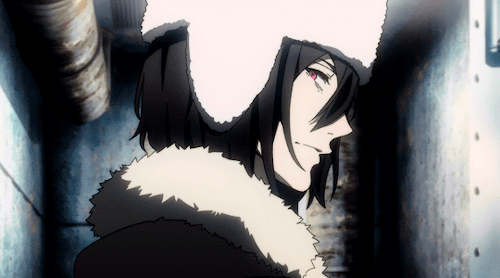
Fyodor Dostoevsky: Real life vs BSD
- a short analysis by Nix Nephili ♡
"Above all, do not lie to yourself. A man who lies to himself and listens to his own lie comes to a point where he does not discern any truth either in himself or anywhere around him, and thus falls into disrespect towards himself and others. Not respecting anyone, he ceases to love, and having no love, he gives himself up to passions and coarse pleasures in order to occupy and amuse himself, and in his vices reaches complete beastiality, and it all comes form lying continually to others and himself. A man who lies to himself is often the first to take offense. it sometimes feels very good to take offense, doesn't it? And surely he knows that no one has offended him, and that he himself has invented the offense and told lies just for the beauty of it, that he has exaggerated for the sake of effect, that he has picked up on a word and made a mountain out of a pea--he knows all of that, and still he is the first to take offense, he likes feeling offended, it gives him great pleasure, and thus he reaches the point of real hostility...
Fyodor Dostoevsky, The Brothers Karamazov"
--> Reported to be Fyodor's favourite book out of the ones he wrote.
This is one of the most expressive ironies of his beliefs and the anime/manga.
-Real life Fyodor disregards the idea of man to lie to himself and eventually starting to believe it as truth- contradicting BSD Fyodor and his delusions.
The book referenced in the anime is Crime and Punishment, this book sustains the belief Fyodor had, that no crime goes unpunished
It follows the character Raskolnikov, which is a sinful soul and all his crimes, have their punishments
Overall BSD Fyodor is very detached from the real life inspiration of his ability.
The bigger instances are:
1. Dostoevsky's pure LOVE for children..
In real life, Fyodor loved children unconditionally.
BSD Fyodor has said he wishes mercy upon children, however he has yet to give it, having killed multiple children.
This is an absolutely glaring contrast:
"Love children especially, for they too are sinless like the angels; they live to soften and purify our hearts and, as it were, to guide us."
Fyodor Dostoevsky, The Brothers Karamazov
2. The real life Fyodor considered intelligence and overall intellect to be inefficient in defining a person or making decisions.
As for BSD Fyodor, his intellect defines him. As he was presented, he does not match his intelligence neither physically, in emotional awareness nor morals.
"It takes something more than intelligence to act intelligently."
Fyodor Dostoyevsky, Crime and Punishment
"You can be sincere and still be stupid."
Fyodor Dostoevsky
"It is not the brains that matter most, but that which guides them — the character, the heart, generous qualities, progressive ideas."
Fyodor Dostoevsky
3. The real life Fyodor., believed wholeheartedly in love.
"Love the animals, love the plants, love everything. If you love everything, you will perceive the divine mystery in things. Once you perceive it, you will begin to comprehend it better every day. And you will come at last to love the whole world with an all-embracing love."
Fyodor Dostoyevsky
"What is hell? I maintain that it is the suffering of being unable to love."
Fyodor Dostoevsky, The Brothers Karamazov
Even going as far as tying it directly to his religious beliefs.
Fyodor was a devoted Orthodox Christian in his life- hence love and its nature was holy in his eyes and he goes into expressing this.
Furthermore, Dostoevsky displayed no God complex. He sustained religious theories and philosophies however he did not believe himself to be God.
He actually hypothesized that IF indeed there were to be no God, every single human would be their own God. Which cancels BSD Fyodor's egotistical illusions of grandeur.
"If you want to overcome the whole world, overcome yourself."
-Fyodor Mikhailovici Dostoevsky
The real life Fyodor -
Didn't condemn suffering.
In the actual Crime and Punishment he displayed how he was at terms suffering isn't something to be rid of
BSD Fyodor wants to rid the world of sinners and suffering
"Pain and suffering are always inevitable for a large intelligence and a deep heart."
Fyodor Dostoyevsky, Crime and Punishment
"I could not become anything; neither good nor bad; neither a scoundrel nor an honest man; neither a hero nor an insect. And now I am eking out my days in my corner, taunting myself with the bitter and entirely useless consolation that an intelligent man cannot seriously become anything, that only a fool can become something"
The writers took the God complex from his book "Demons".
Where he presented his beliefs in a dialogue
However what he says here differs in essence from the BSD portrayal drastically
"If there is God, then the will is all his, and I cannot get out of his will. If not, the will is all mine, and it is my duty to proclaim self-will."
"Self-will? And why is it your duty?"
"Because the will has all become mine. Can it be that no one on the whole planet, having ended God and believed in self-will, dares to proclaim self-will to the fullest point? It's as if a poor man received an inheritance, got scared, and doesn't dare go near the bag, thinking he's too weak to own it. I want to proclaim self-will. I may be the only one, but I'll do it.
"Do it, then."
"It is my duty to shoot myself because the fullest point of my self-will is--for me to kill myself...to kill someone else would be the lowest point of my self-will, and there's the whole of you in that. I am not you: I want the highest point, and will kill myself...It is my duty to proclaim unbelief," Kirillow was pacing the room. "For me no idea is higher than that there is no God. The history of mankind is on my side. Man has done nothing but invent God, so as to live without killing himself; in that lies the whole of world history up to now. I alone for the first time in world history did not want to invent God. Let them know once and for all."
Fyodor Dostoyevsky, Demons
Following this narrative, BSD Fyodor should kill no one. Hence it is the "lowest point of self will".
Contradicting with his real life counterpart.
-thank you :) - Nix
#bsd headcanons#bsd season 4#bungou stray dogs#bungou stray dogs dazai#decay of angels#fyodor dostoevsky#fyodor icons#fyodor fluff#bungou gay dogs#bsd manga#fyodor bsd#nixnephili#bsd fanart#dazai osamu#fyodor fanart#fyodor x y/n#bsd analysis#bsd writing
137 notes
·
View notes
Text

A few tiny things off top of my head that Yelan's SQ that ended up staring me right in the face, even if they oversold some of them a little bit at times (or done a little oddly)— but it's all about nuance, nuance.:
— Tianshu. She wasn't joking about being interested in the position of the Qixing's Tianshu, Uncle Tian didn't just take her at her word, he actually simply read her well. Regardless of whether she denies it by the end of the SQ, it is a position that someone with a mind like Yelan's is perfect for, and she knows that. The SQ does a decent job of showing that she understands multiple facets of intelligence (planning ahead and oversharing vs. adapting and divulging information only when the situation calls for it), she understands the difference of when people are driven by their emotions or their logic (and how to adapt to both), she knows how to socially play right into people's hands in ways that appeals to them; all in all, she's perfect for a position that revolves around information and people. Perfect. The only problem is that it takes her out of the field, and being in there is exactly what she enjoys the most. Her entire character plays around the defiance of boundaries, so why would she willingly place herself within such constraints? Besides, there is also the question of the Chasm. It is my firm belief that as dangerous as it is, and how monumental of a problem it's posed for Liyue in its history, she will never let that responsibility fall onto anyone else's shoulders. So in essence, to become Tianshu, she would have to restructure the entire position to be able to properly forego the bounds that Liyue Harbor would pose on her and leaving, which just like she is vulnerable to now, puts her at risk of capture or death. That is too high a risk for someone that would fill such a monumental position. So was Uncle Tian wrong for reminding her of the 'joke' that she made? No, for it was never a joke— it is simply not something she wants to turn into a feasible option. In other words, Uncle Tian is also very good at what he does. Good man.
— Identities. Here I go again, but this time to note: I'm not too big on how they depicted this bit in her SQ when we're going about the harbor's wharf. She fumbled a little too much at coming up with identities on the fly (and Paimon/Traveller gave her too much praise), or in better words: she hesitated too much. I understand that this may have been done to give her some flaws (or I'd have to account it to sub-par writing), but making something so baseline of her profession to hold a clear flaw isn't consistent with her character, her achievements nor her reputation. Numerous of Yelan's flaws lie in her personal life, they are pointed out in her character story, but they are minimal in her work. This isn't unrealistic, she's written to be an exceedingly rational and logical individual who thrives in her work, and it doesn't require to hold the same flaws as the other portion of her life to be well-written. Any way, I digress; another reason why I found this element of the SQ to be a bit inaccurate in terms of consistency: Yelan primarily operates within Liyue (Harbor), why would she be so careless with her identities and how she presents herself? Now of course I don't expect Hoyo to change her entire look simply for her SQ, but her first character story does seem to insinuate that she changes up her looks to match her identity— she frequents the same pharmacies without the pharmacists recognizing her. So realistically, I think we can deduce from this that, in all reality, she would have changed up how she appears at least a little: a coat, a hat, a change of hair. Someone she re-visits going 'Have I seen you before?' versus 'Ah, it's been a while since I've seen you!' are two vastly different things. On top of that, madam does not fumble— she actively shows in scenes that she is very patient, and we've seen her smile and take an extra few seconds before she speaks, that's how she handles 'hesitation', rather than being too hasty and speaking much too soon.
#[ mini study. ] that which hides inside her… that constant calling; it is the blood of heroes which has been howling for 500 years.#[ i tag it with mini study but is it really a mini study? ]#[ at this point 'mini study' versus 'meta' is... are there multiple bullet points? yes? then it's a mini study. ]#[ a meta is on one single topic. >.> ]#[ or at least that's how i'm justifying it. ]#[ also can i just say that wriothesley's gameplay is everything i've wanted in a game for years? it's so engaging and active. ]#[ and it's so utterly rewarding. ]#[ especially when combining him with yelan's constant uptime of her ult? jesus. ]#[ and benny. ugh. bENNY YOU AMAZING HUMAN. ]#[ any way i digress aGAIN [my life story honestly] -- i'm in love with yelan and i have too muc to say. ]#[ i genuinely need to talk about how she functions in terms of identity creations. truly. ]#[ like even when she presents herself in fontaine to neuvillette and wriothesley-- they obviously know she's... ]#[ tied to liyue. tied to the qixing. but she won't divulge more than is necessary. literally there's no need to. ]#[ diplomacy isn't always about information. ]
6 notes
·
View notes
Note
For the ask game, what makes bakudeku special to you?
It's about how they inspire each other. It's about how they make each other want to grow, to be better, to DO better. It's about how their strengths complement each other's weaknesses, and it's about how they dearly, truly, respect and admire each other. In ways that no one else really seems to do.
We see very early on that Deku admires and emulates Katsuki. He tells us as much, saying stuff like how he knows its weird to admire someone who is so mean to him, but that he can't help it because Katsuki is so spectacular.
How is he spectacular? I think a lot of the audience think that at first. Katsuki is presented as mean, immature, loud, but still engaging and interesting. But Deku is right. Katsuki is spectacular. He works hard, he's intelligent, he has incredible control over his quirk, and has a good mind for combat. More importantly though, he, unilaterally, starts putting in the work to recognize his own mistakes, apologize, and do better. In less than a year! He gets his whole world turned on his head and he resolves to do better. And then he actually does it! He really is amazing.
After that, we see that Katsuki thinks that Deku is also spectacular. From Katsuki's perspective, their falling out had nothing to do with Deku's quirk or lack thereof. Rather, Katsuki started feeling inadequate when presented with Deku's natural selflessness and ability to be a hero. From the beginning, Katsuki saw that Deku had strengths he didn't, and that scared the shit out of him. In a way, Katsuki was actually the first character to believe in Deku's ability to be a hero. Then over the course of the story, Katsuki comes to respect and admire all of Deku's strengths.
Really, really I guess it's about the character growth my friend. It's about how they inspire each other to change and grow. They're rivals, but it's more than that. They want each other to succeed, and grow, and are in awe of each other when they do.
It's about the fact that they are more familiar with each other's flaws and weaknesses than anyone else! And yet! They admire and care for each other anyway! For all of Katsuki's anger and emotional stupidity, Deku still wants to be like him! He still wants to catch up to him, and stand by his side. For all that Deku is terrifyingly self-sacrificing, and a little hot-headed himself, Katsuki thinks that he still needs to catch up to him. He still wants to be closer to him again.
They just!!!!!! They have it all! And this isn't even mentioning all of the tropes I love that they embody. Childhood friends (who understands us better than the people we grew up with?) rivals to lovers, friends to lovers, and all of that!!
There was a post recently that said that there will never be anything like bkdk again. And yeah, I don't think that there will be. They're pretty special.
#okay this got LONG#i thought about adding like pictures and shit but eh you get the idea#thank you for the ask dude!!!!!#this ended up being really fun to write lmao#bkdkbk#bnha#mha
9 notes
·
View notes
Text
I’m not sure how many people would qualify The Wonder as a horror movie, it sits itself quite prettily in the ‘period drama’ section of Netflix, but I’ll be damned if I don’t give it a fair shake as what I felt the movie truly was, and that’s a horror film. Normally I’d put an enticing gif here of something, but either the title is too vague or the movie hasn’t hit its stride yet, so unfortunately my words will have to suffice.
Right off the bat: the framing device is weird and I didn’t like it, so let’s choose to ignore it here because it proved itself entirely pointless and useless. It’s barely a couple of minutes at the beginning and end anyway. As if the movie wasn’t artsy enough with its popular gray washes and dirt and a sense of ‘naturalism.’ Head’s up: If you are looking for a colorful piece of cinema, look elsewhere.
The Wonder is an inverse exorcism movie. Not quite on the same level as the Shudder original Anything For Jackson, the term inverse is most applicable here, while Jackson is more reverse. The question of what that means is easily answered: Wonder isn’t about a demon, it’s about applying divinity to someone and wanting it to be there beyond reason. It’s characters wish to put Holiness into someone rather than remove, or in Jackon’s case insert, the unholy from within.
It is an intelligently made twist of the religious horror genre, and garners emotions of a different stroke. If we consider exorcism movies to be horror, then so too should The Wonder be considered horror. It plays on the same tropes, the same pace, the same escalation, yet does not view the phenomenon as of the devil, but rather of Christ.
This movie is horrifying. Perhaps it’s the fact that genre star Florence Pugh is in it, or that the whole cast is made up of experienced actors of genre across the board, but it’s unfathomable how anyone could see it as anything else. Set in the late 1800s just after The Great Hunger in Ireland, something generally accepted as the fault of the British, the plot follows Pugh as English nurse Elizabeth, or Lib, sent to watch and investigate whether or not Anna, a fasting girl who apparently hasn’t eaten for several months, is legitimate and ‘a wonder.’ To quote: “[They are] eager to see the wonder in every ordinary child.”
Her investigation is thorough, and without spoiling anything there were definitely one or two details that took me by surprise. Wonder places itself in the new age of horror, this age of what I prefer to call “emotional horror,” where fear is derived from character reaction, intense feelings exchanged, and the revelation of secrets. It is belief in this movie, faith, that are the chains that bind. To be frightened of someone’s faith, and of what that faith may mean, is certainly not a new idea, but one not usually applied to Catholicism or any derivatives of Christianity.
To the modern film, Christianity is the true ‘holy’ faith system. How often have we seen Louisiana Voodoo, or Judaism, or Islam put on the brutal chopping block of horror’s worser, racist tendencies towards faiths? Or villains? Black people, practitioners, Muslims, Jewish characature, Romani peoples, indigenous populations, all victims of the horror genre. But here we have an unspoken fear, universal all in its own right, but decidedly white and European. Unlike other pieces of Catholic horror, however, we don’t deal with devilish nuns or lesbian affairs or dancing in the wood at the witching hour. This movie is about belief, holy faith, and nothing devilish ever graces the text. It deals with the female self image through the illness of anorexia miribalis, which is exactly what it sounds like. While men are allowed to pay penance through self flagellation or other pains of the flesh, it was this way in which women were found to seek holy suffering.
It deals with literacy and understanding through Kitty’s plot, played by Niamh Algar from Censor, which I loved, and the abuse of youth and women. A nun is present to watch young Anna as well, but who is she to speak out against the parish priest? The question the movie begs is simple, yet answered easily enough. There’s a question of complicity. After all, “All over the empire, are not children left to die in ditches and gutters every night of the year?”
Fire is used as a purging thing, a holy flame, and the setting allows for us to naturally draw parallels to the burning of witches, and constantly makes reference to the eternal burning of Hellfire. You can hardly go a minute without the reminder that the ‘miracle’ girl Sarah is sure her brother is burning forever, and the mystery to why is definitely a hardy gut punch. Even if you read the film right, it’s still rough as Hell, pun intended.
The Wonder is smart that way, clever, slow. Very slow, at times. It builds, of that there is no doubt, but it wouldn’t have suffered 15-20 minutes shaved off. Much like we stare at Pugh’s ever-dirtying dress, the sound of Pugh’s feet plodding along through the mud can be rather indicative of the pacing. As mentioned, it’s a gray, almost bland looking film, alternating from overcast outdoor settings to dimly lit candlelight vigils. The use of lighting is, thank god, meticulously designed, which feels like a dying art in this day and age. You can see, but you can also not see. And such is the dichotomy not only of the visuals, but of the concept of the holy spirit. It makes the viewer question who is right, and who is wrong. Darkness so often represents wickedness, or even two facedness. But does it here? Or is it those who are seen in all their glory who are the evildoers? Those who hide in the shadow versus those who are bathed in light.
If you like religious horror, this is a movie for you. If you’re new to religious horror, this might be a really great starting point. There are no jump scares, no gore, no demonic possession. Just plain old human dread. I’ve always liked the feeling of dread in my horror.
Completely pointless framing device aside, The Wonder was a good, if jammed movie that was just a little bit too long. There are a lot of things to think about here; probably being worth a second, or maybe even a third viewing, depending on your taste. The acting was sublime and did in fact live up to the promise of the opening monologue that every character on screen truly believes what they are experiencing is real, an astoundingly bold claim for a horror movie, a genre not exactly known for its groundbreaking performances. Still, there is not one performance, not one moment that fell flat, or felt unbelievable.
Shortcomings aside, it is still worthy of a definite 4/5*
#the wonder netflix#horror#film#movies#review#spook study#writing#4/5*#The Wonder#the wonder 2022#movie review#my writing
29 notes
·
View notes
Text
has anyone else noticed the fucking.. thing recently where characters in shows/books/games/everywhere start talking like a trained therapist the moment they are in a serious conversation with another character.
this is to be expected in kids' shows wherein the tone shift indicates that they are about to explain something children need to learn (like a parental figure telling the younger main character "sometimes... people want to be left alone, and that's okay 🤗☺️"). but in other stories, especially ones that arent set in the modern day and world, it's a completely jarring shift. i feel like this happens a lot when characters talk about topics such as sexuality or relationships or trauma. suddenly the writing doesnt have faith in the audience at all to understand a message like "abuse is bad" or "it's ok to struggle with conflicting emotions" without it being said gently to the sound of reassuring music by a character speaking like a self-help guide personified.
the emergence of this trend is for sure related to the prevalence of the belief that "portrayal" always = "condonement". but art shouldnt have to act like all of its audience is 5 years old and feel like it's unable to present complex themes without a mouthpiece character for the author essentially expressing "i know this thing is morally wrong, don't cancel my writing for portraying it". characters should be allowed to be messy/talk in a way that isnt the most emotionally intelligent. and if any part of the audience believes that characters' actions are always like. an assertion of how that writer thinks people should behave in given situations then god they should learn to interpret art or else they will find much of it unbearable. if you are going to question a writer's biases and the subsequent faults of their stories comprehensively then you need to understand this at least first.
#vadtalks#long post#soorry this has probably been said a million different times in a million different ways but i saw it again and got angry.. will#you gorgive me
5 notes
·
View notes
Text
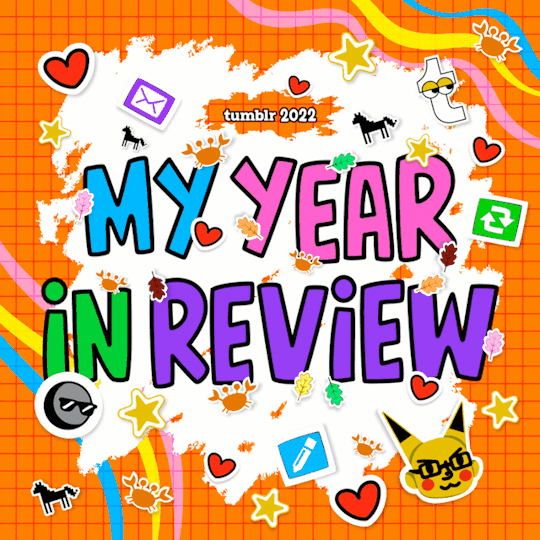
I posted 10,577 times in 2022
That's 1,911 more posts than 2021!
377 posts created (4%)
10,200 posts reblogged (96%)
Blogs I reblogged the most:
@submeowchinegun
@elytrians
@sabertoothwalrus
@arttheclown
@skitter-kitter
I tagged 3,062 of my posts in 2022
#chatter - 214 posts
#answers - 200 posts
#horror - 130 posts
#dc - 120 posts
#w&w - 111 posts
#halloween - 65 posts
#tmnt - 65 posts
#life ref - 64 posts
#ml - 63 posts
#*palpatine voice* queue it - 51 posts
Longest Tag: 136 characters
#‘i don’t get the appeal’ dont care didn’t ask plus we’re all functionally riding our little tricycles thru the lava field of pop culture
My Top Posts in 2022:
#5
broke: megamind mispronounces words because he's weird and/or was given inconsistent education
woke: megamind mispronounces words bc he reads frequently and sees words he doesn't hear used in everyday conversation
bespoke: we see megamind's pronunciations get challenged often -- metro man corrects his pronunciation of "metro city", ditto minion for "stewart" and megs even corrects himself when pronouncing "school" to maintain his cover with roxanne. we see him go on to say "stewart" correctly, but keep mispronouncing "school" and "metro city". his mispronunciation is a conscious choice -- he's saying words the way that feels right to him and is unwilling to bend the knee about it. the only exception is someone else's name, arguably out of respect for other people's identifying traits
1,013 notes - Posted September 23, 2022
#4
"it's fandom you're allowed to dislike whoever you want" WRONG.
no one is allowed to dislike kat elliot
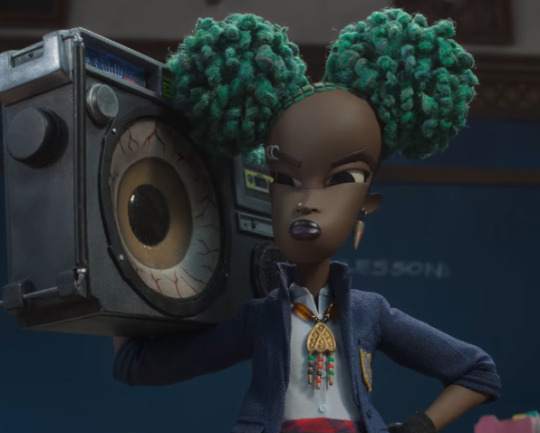

See the full post
1,130 notes - Posted November 3, 2022
#3
anyone else think about jobu tupaki and the volume of campy, flamboyant outfits she presents herself with, or how that relates to joy’s queerness. anyone remember the “you’re still hung up […] that I like girls” line that implies that alpha joy at one point struggled to get alpha evelyn’s acceptance like main-universe joy still is. you ever think about the multitudes of conversations jobu tupaki must have experienced with her mother, ending in rejection and acceptance and every shade in between, and about her deciding “all else being equal i’m going to present myself as wildly and proudly as i want”. you ever think about the goth phase main-universe joy went through before she came out. you ever think about about the possibility of joy’s taste in clothing changing to reflect that post-movie now that she has an accepting foundation to her relationship with her mother & grandfather. you ever th
2,167 notes - Posted April 19, 2022
#2
miscellaneous things i appreciate about wendell & wild:
-the nuance built into kat’s punkness. yes, she absolutely is a contrarian rebellious teenager, but it’s also genuinely how she’s always been. it’s not portrayed as rebellion for rebellion’s sake, it’s kat’s way of reasserting her identity and her connection to her parents when she’s spent years having her choices stripped from her.
-how many of the characters like kat. raúl sees a kindred spirit. siobhan wants to be her friend and is being kind in the way she knows how. sister helley reaches out to her even before she becomes a hell maiden. wendell & wild are in awe of her. ms. hunter doesn’t let her position prevent her from treating kat like an individual with agency and importance. it’s heartening that kat, a character defined by guilt both personal and state-issued, is coming into a setting where people genuinely want to see her thrive.
-the future sequence where it’s revealed she stays in rust bank and helps restore it to its former glory made me cry. it’s what they all deserve.
-no one has any “it’s my style” excuses for whitewashing when w&w gave us a litany of black characters with individually distinct features.
-even the demons have more emotional intelligence than your average corporate CEO.
-“you don’t get to smack me”
-when all that’s left of the memory monster is the memory of losing her parents, kat hugs it, letting it dissolve into her. she’s acknowledging that the choices she’s made and the things that’ve happened to her have gotten her to this point, but she’s absolving herself of the guilt — embracing her past instead of hating herself for it.
-raúl’s struggles as a trans boy aren’t framed as oppression porn. siobhan’s accidental deadnaming is just that — an accident— and undoubtedly one she’ll learn from in the future. his mother supports him without reservation. kat doesn’t even make note of it. they could’ve easily added catty smiles, tired sighs and “wait, you’re trans?” moments, but they didn’t. raúl is a human being whose transness informs his life without being crushed by it.
-siobhan’s arc is wonderful. she doesn’t become kat and raúl’s personal savior, she doesn’t angst over what she has to do, the story never becomes about her — but she uses her position (read: her class privilege) to do what she can. she becomes part of the solution.
-i know the last two points read like “duh, everyone should be doing that” but it’s such a relief to have a film get these things right, unapologetically so and without a core of virtue signaling. it’s nice to not have the stories we want told held for ransom, then declawed by producers because pissing off uninspired rich people would be bad for business.
2,725 notes - Posted October 30, 2022
My #1 post of 2022


See the full post
3,822 notes - Posted February 18, 2022
Get your Tumblr 2022 Year in Review →
7 notes
·
View notes